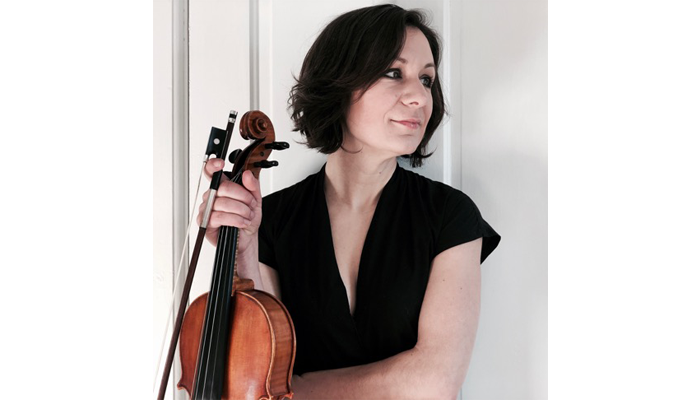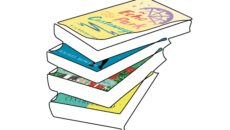Music holds undeniable power to inspire, to comfort or heal, but few of the songs on our “It’s been a long day” playlists probably speak to us directly as adoptive parents. The release of Lissa Schneckenburger’s new album, Thunder in My Arms, should change that. This original song cycle is based on her experiences as a parent who adopted a child from foster care, and also draws inspiration from the larger adoptive and foster community she’s become part of.
“In my attempts to be a better parent to my child, I found plenty of invaluable books and workshops, but no songs,” says Schneckenburger. “And not everyone can go to every foster adoption training or read every book they want to, so hopefully this music will provide another avenue for understanding a child’s difficult background and responding with empathy.”
We spoke with the New England fiddler about writing and sharing her new album, and what she hopes listeners will take away.
Adoptive Families: How did you decide to build your family through adoption? Through foster adoption in particular?
Lissa Schneckenburger: I’ve always known from an early age that I wanted to adopt and, when I started doing research as an adult, it seemed like foster adoption was best for us. Partly for financial reasons, but also because I’ve had family members who have been adopted or had experiences with foster care, and it seemed like a way to connect with our community that was important to us. That turned out to be so true—we are grateful to have met all the people we did as we were growing our family.
Soon after our son came to live with us, when he was almost three, we realized it was best for all of us to be a one-child family, rather than foster many kids. This has allowed us to focus on his needs, and it has allowed me to continue to advocate for and interact with other foster and adoptive community members. The experience of meeting all these families is what really inspired me to write the music for this album. Of course, some of the songs are more personal, but others started with a germ of an idea from one family, then something from another, and just blended together into this musical tapestry.
AF: What inspired you to start writing songs, and then a whole album, about attachment and adoption?
LS: The first few songs were generated very naturally just for my own purposes, as a creative way of dealing with some intense emotions. Once I realized that it was becoming a collection of music on the topic of attachment and developmental trauma, I became more purposeful. I sought out friends and fellow musicians, and also collaborated with a group of therapists in Brattleboro, Vermont, called the Children and Parents Project, who helped our family with attachment. For instance, I asked my son’s therapist, “What do you find yourself repeating? What do you say every single day to different parents?” And then we created songs out of those ideas—about the need for empathy, for understanding how early trauma can manifest in surprising ways later in a child’s life—just kind of saying things that people need to hear.
AF: Which song did you write first? How do you see all of the songs working together?
LS: I started writing the song called “I’ll Stick Around” a couple years ago. I’d had a long conversation with a friend the night before, about life and her family and how things that you experienced as a child can be reincarnated in your children or your family. The next day, on a long drive to a gig, I had all these thoughts and ideas rattling around in my head. I was a little early and I just remember parking my car and writing down all the lyrics in this huge flurry, scribbling on scraps of paper and napkins.
In terms of the cohesiveness of the album, I feel it’s important to understand an issue from multiple perspectives. In a way, the songs are all kind of talking about the same thing, but the narrator of one song is a small child, the narrator of another is a teenager, another, an adoptive parent, another a birth parent—so they work together to create a whole experience. The truth is, dealing with trauma is not easy, and there is no easy answer or solution, and so seeing it through the eyes of different people is what feels most realistic and holistic to me.
AF: What does the album title, Thunder in My Arms, come from?
LS: This is a lyric from one of the songs, called “The 11th labor of Hercules.” I co-wrote this one with Genna Rose Nethercott, a local poet and musician. We were ruminating on the idea that there are some folk songs, tales, and myths that could be used as metaphors for loving somebody who has experienced trauma or addiction. Having that relationship and being steady and strong for that person can itself be traumatic and intense.
AF: “Look Away” [watch the music video below] is written from the perspective of a child as he enters a new home, describing how fearful and disconcerted he feels in this new environment:
I am a stranger in a house that’s full of strangers,
I am afraid to turn the lights off in the night.
And they say, ‘Child, don’t you worry,’
But if you had known what I have known then you would worry.
Could you tell us more about this song?
LS: The first seed of an idea for that song was this raw, aggressive anger that I was witnessing in my own very young child. It’s frightening to be around some who has that much fury, and is so irrational and has no way to organize himself and calm down. But I also remembered this short film they played for us during our foster parent training. It depicted a young girl, a foster child who was in a new home, and it demonstrated how someone could be triggered by something you would expect would be fun or sweet or exciting, like ‘Let’s order pizza’ or being given a present or a particular day of the year. And then it showed the backstory for this girl, which this foster family had no idea about. So I wanted to incorporate that into the song as well—to show how somebody could end up feeling so lost and confused and angry all at the same time and set the stage for this kind of emotional reaction.
AF: Is there another song on the album that holds particular personal significance to you? Can you tell us more about it?
LS: There’s one called “I Need Us Together,” that was inspired by a comment from our family therapist about co-regulation. When we have meetings with teachers and administrators at our public school, we are trying to advocate for our child, while their goal is often to get each child to self-regulate. As it turns out, that is something that your body and brain develop from an early age from your, hopefully, consistent caregiver. But if someone has experienced disruptive attachment or early childhood trauma, they haven’t had that. I was talking with our therapist about these meetings, and he said, “Oh, of course, you need a calm relationship. Your son needs another strong ego to latch onto, almost like an infant would with his mother in an ideal situation.”
AF: What does your son think of these songs? Your music?
LS: He has many different opinions depending on the moment. I think he’s excited about it overall, especially the one he helped me write. But, he also gets very frustrated with me; if it were up to him, I would be all his, all of my attention, 100 percent of the time. So, the fact that I’m a musician is really hard for him. And he’s not a huge fan of crowds; being around a lot of people can be difficult for him. So, he sees me writing these songs, and getting ready to go out to play them, but then he’s not along for that ride as much as another kid might be.



